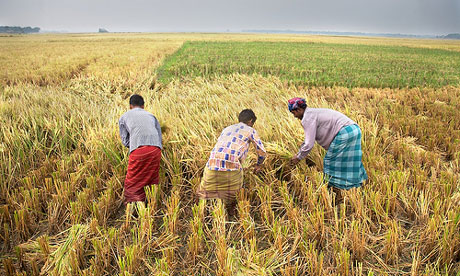The growers will have to pay a heavy price for the government move to heavily trim the allocation in the new budget for the agriculture sector against the backdrop of a downtrend in food prices in the international market.Economists and activists observed that the proposed 25 percent cut in the agriculture subsidy will only intensify the sufferings of the farmers who have already been counting losses with the harvest of major crops, including rice and jute, due to the gradual increase in the cost of inputs allied with the almost stagnant price of the produce over the last two years.
Finance Minister AMA Muhith in his budget speech on Thursday proposed reducing the agriculture subsidy to Tk 9,000 in the current fiscal from the amount of Tk 12,000 allocated under the revised budget of the fiscal 2012-13.
The proposed budget has also set the target of agricultural credit distribution at Tk 14,595 core, whereas the target was set at Tk 14,130 crore in the fiscal 2012-13.
In its budget reaction on Friday, Centre for Policy Dialogue (CPD) estimated that Tk 8,300 crore may be required as subsidy only for fertiliser in the fiscal 2013-14, and that a higher subsidy may be needed for other agricultural inputs.
Former research director of Bangladesh Institute of Development Studies (BIDS) Asaduzzaman told UNB that the cut in subsidy will have a huge impact on the rice farmers on the oncoming seasons. “You need to consider that the majority of the rice farmers are not getting the fair price in recent times. The Tk 3,000 crore cut in agriculture subsidy will only intensify their plight.”
He noted that there has been gradual decline in the budgetary allocation for the agriculture sector over the last five fiscals. “The government is continually reducing funds for agriculture researches at a time when the next generation scientists and researchers are ready for it and there is a need to bring forth new technologies to boost the crop production any further from the pick reached couple of years back.”
“The reduced subsidy will start to have its impact on the farmers within three to four months, whereas the reduced allocation for agricultural research will also affect the food safety in the long run. So, the budget lacks both the short term and long term goals regarding the agriculture sector,” added Asaduzzaman.
The budgetary ratio of the government expenditure, including development and non-development expenditures, in the agriculture sector as stated in the proposed budget for the 2013-14 fiscal has decreased compared to that of the previous fiscal.
The total size of the proposed budgetary allocations for the Agriculture Ministry and the Livestock and Fisheries Ministry in 2013-14 stands at Tk 12,275.98 crore and Tk 162.66 crore respectively, accounting for 5.51 and 0.47percents of the total budget expenditure.
The ratio of the budgetary allocations to the Agriculture Ministry stood at 7.85 percent in the fiscal 2012-13 and at 7.23 percent in the first budget of the current government in the fiscal 2009-10.
The amount of the (Annual Development Programme) ADP allocation to the Agriculture Ministry proposed under the fiscal 2013-14 is Tk 1,360 crore, which is 2.07 percent of the total ADP allocation of Tk 65,870 core.
Bangladesh Krishak Samity president Murshed Ali said: “It’s not certain whether the current government will retain the office after the next election, but its certain that the cut in agriculture subsidy will affect the farmers badly. I must say that the decision reflects that the government is not considering the issue of the losses of the farmers.”
“The government wants to contain the general inflation to 7.5 percent in this fiscal, mostly powered by the factor of satisfactory agricultural production. That implies it is confident of a stagnant price in agricultural produces. In this instance, what will happen to the rice farmers who were counting losses with the previous state of prices and input subsidy?” (Source: UNB)




